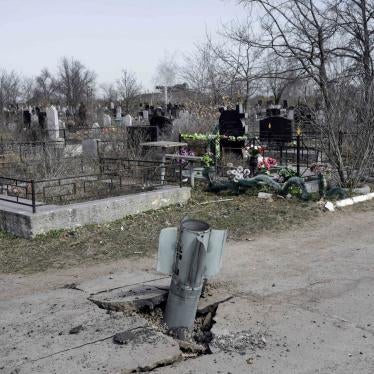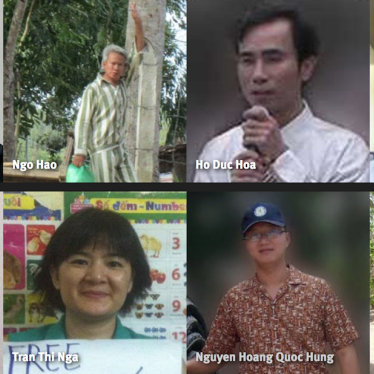This note aims to outline key areas of concern in Georgia's human rights record that we hope to see addressed on the occasion of the European Union's upcoming Human Rights Dialogue with Georgia. We believe this dialogue is a crucial opportunity to candidly assess shortcomings in the Georgian government's human rights record, and to encourage the Georgian leadership to undertake concrete steps to address them in the spirit of the European Neighborhood Policy and its Action Plan.
Our concerns fall into the following categories: indiscriminate and disproportionate attacks during the August 2008 armed conflict over South Ossetia; lack of accountability for the excessive use of force by law enforcement officials; criminal justice reforms that violate human rights standards; and pressure and threats on the media.
Conflict over South Ossetia
We note that the agenda of the dialogue includes discussion of the humanitarian consequences following the August 2008 war between Russian and Georgia over South Ossetia. However, it is extremely important to also include international human rights and humanitarian law violations and accountability for them as a separate agenda item.
During military hostilities in South Ossetia, Georgian forces conducted indiscriminate attacks, firing Grad multiple rocket launchers - a weapon that is indiscriminate when fired at civilian-populated areas - into Tskhinvali, the capital of South Ossetia, and outlying areas. They did this at a time when civilians still remained in the Tskhinvali and outlying areas. The Georgian military used tanks and machine guns to fire at buildings in Tskhinvali. While South Ossetian forces had fired on Georgian military forces from at least some of these buildings, civilians were still sheltering in some of the buildings at the time when they came under attack, raising concerns of indiscriminate attacks and attacks causing disproportionate harm to civilians.
The Georgian military used cluster munitions against Russian forces in South Ossetia. Although Human Rights Watch did not research if humanitarian harm was done by these weapons in South Ossetia, Human Rights Watch documented an unusually high number of unexploded cluster submunitions that fell short of the weapon's minimum range in nine villages south of the South Ossetian administrative border. Four civilians were killed and eight injured in this area of Georgia as a result of Georgian use of cluster munitions; most of the deaths were caused by explosive duds after the attacks. Available evidence suggests that a massive failure of the weapons may have caused Georgian submunitions not to reach their intended targets in South Ossetia. Regardless of whether the weapons functioned or failed, their use illustrates that cluster munitions are always highly dangerous and cause unacceptable humanitarian harm.
The EU should recommend that Georgia:
- Investigate and hold accountable members of the Georgian armed forces, regardless of rank, responsible for serious violations of international human rights and humanitarian law. Such an investigation should be prompt, thorough, independent, impartial, and open to public scrutiny. The Georgian government has said that it cannot conduct a full investigation into indiscriminate or disproportionate attacks because the de facto South Ossetian authorities will not grant them access to do so. We hope you will convey to the Georgian government that it should investigate how the decision to use Grad rockets was made and to hold responsible those who ordered or are implicated as a matter of command responsibility for indiscriminate attacks;
- Sign the Convention on Cluster Munitions, which opened for signature on December 3, 2008, and ratify it as soon as possible thereafter;
- Investigate impartially and independently Georgian use of cluster munitions. Such an investigation should assess carefully whether the munitions were used in a manner consistent with international humanitarian law.
Lack of accountability for excessive use of force by law enforcement
We also urge the EU to include as a separate agenda item the need for prevention of and accountability (or lack thereof) for excessive use of force by law enforcement officials. Despite repeated calls from key international actors, including the Parliamentary Assembly of the Council of Europe (PACE), the Georgian government has refused to launch a comprehensive investigation into the events of November 7, 2007, when police used excessive force against largely peaceful political demonstrations in the capital, Tbilisi, resulting in at least 500 injured. Authorities initiated investigations into only a handful of cases of possible excessive use of force, but none has born any result.
The government has also failed to conduct a comprehensive investigation into the March 2006 operation to quell a riot in Tbilisi Prison No. 5, which left seven prisoners dead and dozens injured.
It is especially important to raise the issue of government use of force in response to demonstrations in light of the demonstrations ongoing in Tbilisi today. The government's response to the new wave of protests that started on April 9, 2009 has been restrained and police avoided so far coming in direct contact with the protestors. However, there have been a growing number of incidents in which unidentified men in civilian clothes beat and threatened demonstrators leaving protest sites. Prompt investigation into every single incident and appropriate disciplinary action is needed to demonstrate that the government is not tolerating or condoning such violence.
The EU should recommend that Georgia:
- As a matter of urgency, enact legislation that requires all law enforcement agents, including riot police and members of the special forces, to wear identification, and provide all law enforcement agents with uniforms that include appropriate identification;
- Conduct a thorough, independent, impartial and transparent investigation into the dispersal of protestors on November 7 on Rustaveli Avenue, at Rike, and outside of Imedi television studios. A similar investigation should be conducted on the prison riot of March 2006;
- Promptly investigate all cases of beating and intimidation of protestors and opposition supporters. Such investigation should be capable to lead to prosecutions of perpetrators;
- Train law enforcement personnel to always act in accordance with the UN Basic Principles on the Use of Force and Firearms by Law Enforcement Officials.
Criminal justice system
Despite the government's numerous pardons and amnesties, overcrowding persists in almost all of Georgia's penitentiary facilities, leading to many human rights violations, including inadequate medical care and lack of exercise and family visits. Although in March 2008 the government closed infamous Prison No. 5, which the European Committee for the Prevention of Torture (CPT) and human rights organizations had repeatedly criticized for its overcrowding and inhumane conditions, poor conditions persist in many facilities, and allegations of ill-treatment of prisoners continue, including at the new Gldani prison. The lack of a confidential complaint mechanism adds to impunity for human rights violations in penitentiary facilities.
In 2007 the government lowered the minimum age of criminal responsibility from 14 to 12 for certain crimes, further weakening protections for children in conflict with the law. The new minimum age entered into force in July 2008. However, the minister of justice issued a moratorium on implementation of the law until the creation of a separate juvenile justice system for young offenders. In its June 2008 review of Georgia, the United Nations Committee on the Rights of the Child expressed "deep regret" about the new minimum age and urged the government to reinstate it at 14.
The EU should recommend that Georgia:
- Introduce alternative restraining measures, develop parole and probation system as a response to prison overcrowding;
- Urgently introduce a confidential complaint mechanism in all penitentiary facilities and promptly investigate any allegations of ill-treatment in custody;
- Reinstate the minimum age of criminal responsibility to 14 in accordance with Georgia's international commitments.
Pressure and Threats on the Media
The media environment in Georgia is a mixed picture, with a vibrant print media but limited nation-wide independent television news broadcasting. Although media diversity has improved somewhat with television stations reopening debate shows in the beginning of 2009, more needs to be done to ensure diversity of media in the country.
Following its violent closure by the government during the November 7, 2007 events, the private television station Imedi resumed broadcasting on December 12, 2007, but only to suspend broadcasts two weeks later, citing pressure from the authorities and its co-owner. Although Imedi again resumed broadcasting in May 2008, it resumed news programming only in September.
During the conflict over South Ossetia, the Georgian government blocked access to Russian cable television stations and websites. Russian television channels remain blocked.
Some journalists alleged government pressure and attacks, including during the elections in 2008. A government supporter attacked Hereti radio correspondent Khatuna Gogishvili on the day of the presidential election by taking her recording device and physically assaulting and threatening to kill her. In February 2008 independent journalist Gela Mtivlishvili alleged that state security officials subjected him to surveillance and intimidation before and after the election. Journalists reported interference with their professional duties during the May 2008 parliamentary elections, including several Rustavi 2 and Mze television journalists and Eliso Chapidze, editor of the newspaper Resonansi.
The EU should recommend that Georgia:
- Act to ensure that officials do not improperly pressure media outlets;
- Promptly investigate alleged threats or attacks against journalists.
We hope the above information will prove useful. We believe raising the issues outlined here would help ensure the EU's Human Rights Dialogue with Georgia is meaningful and provide concrete benchmarks through which the EU can sustain a longer-term, proactive engagement with the Georgian authorities on the necessary human rights reforms.




